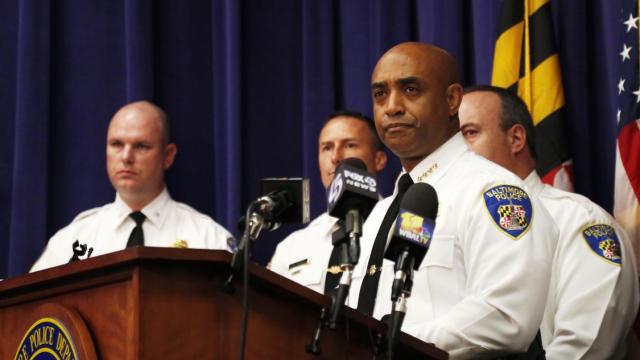
A package of police reform bills that Maryland Gov. Larry Hogan is scheduled to sign into law today, in part as a response to the death of 25-year-old Baltimore resident Freddie Gray, was weakened under political pressure from Maryland police unions, a major force in state politics.
The bills will allow police to wear body cameras, increase the liability cap for lawsuits against government employees, and encourage the state to collect more data on police behavior. But more substantial reforms, including legislation to add a civilian review process and to have state prosecutors investigate all killings by police, were shot down during a legislative hearing in Annapolis earlier this year. So despite the new measures, procedures for prosecuting police misconduct in Maryland will remain the same.
A recent report from the ACLU of Maryland found that at least 109 people died in police encounters in Maryland from 2010 to 2014. Freddie Gray’s death — which came after his spinal cord was severed when he was in police custody — has become the latest national symbol of brutal policing in African-American communities, and has called particular attention to the poor relations between police and residents in Baltimore. Gray’s funeral sparked riots in Baltimore last night .
In a major investigation last year, the Baltimore Sun reported that the city has paid out $5.7 million since 2011 to settle police brutality cases. In many cases, charges were never even brought. For instance in 2012, Anthony Anderson died of internal trauma after police tackled him, claiming that they saw him engage in a drug deal. Even after a medical examiner ruled that the death was a homicide as a result of being tackled, the local prosecutor declined to bring charges.
At a hearing in Annapolis in March, Sgt. Robert Cherry, testifying on behalf of Baltimore police union Lodge 3, called for a continuation of Maryland’s long-standing law requiring that police misconduct investigations be conducted only by fellow officers. “Involve your local leadership, your local unions, your local police departments, and let them determine what’s best for them,” Cherry said, calling for the defeat of “all of these bills.”
“Our chief does not have a problem disciplining bad cops,” said Sgt. Clyde Boatwright, president of Baltimore’s school police union. “So, we’re saying the current system works,” he added.
Maryland’s Law Enforcement Officer Bill of Rights, one of the strongest such statutes in the nation, is a considerable barrier to police reform. The LEOBR, enacted in 1974, shields officers from oversight by establishing a narrow standard for reviewing police misconduct and limiting the ability of victims to press charges. Current LEOBR law states that officers may not be questioned by their superiors for 10 days following an incident. And once an internal investigation is underway, disciplinary action can only happen after a recommendation by a hearing board comprised of the officer’s colleagues.
Reforms to LEOBR were among the many reform bills shot down during the this legislative session.
Del. Alonzo Washington and Del. Curt Anderson, in response to claims that county-level prosecutors often have cozy ties to local law enforcement and have failed to prosecute police killings, proposed legislation calling for state prosecutors to investigate officer-involved deaths. Del. Jill Carter sponsored a bill to make changes to LEOBR, removing “restrictions as to who is authorized to conduct an investigation, interrogation, or hearing against a law enforcement officer.”
Though emotional witnesses testified about incidents of police violence and racism, legislators remained skeptical.
“I left Missouri 29 years ago. I live in Maryland now,” said Del. Deborah Rey, a member of the House Judiciary Committee. Rey questioned the need for police reform bills because the sponsors cited abuses in “Ferguson, Missouri, not Maryland.”
When a witnesss interjected to say that the failure to prosecute Ferguson police officers was a perfect example of the problems surrounding police oversight, Rey cut him off. “We’re not going to adjudicate Ferguson,” she said.
3 WAYS TO SHOW YOUR SUPPORT
- Log in to post comments













